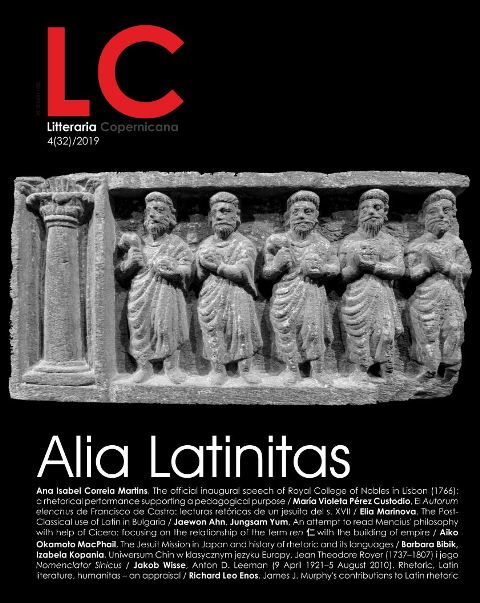An Attempt to Read Mencius’ Philosophy with Help of Cicero: Focusing on the Relationship of the Term 'ren' 仁 with the Building of Empire
DOI:
https://doi.org/10.12775/LC.2019.048Keywords
Mencius, Cicero, ren, humanitas, Chinese empire, true king, perfect man, orator perfectusAbstract
Already in 17th century, Ph. Couplet (1623–1693) used Ciceronian terminology to interprete the texts of Confucian philosophy, including that of Mencius (372–289 BCE), an important philosopher especially in terms of understanding Chinese ethics and morals. This paper attempts to read Mencius’ political term “empire” in the context of political philosophy. The paper observes Mencius’s political idea with help of that of Cicero. For this, it demostrates how and why Mencius introduces the ren as a principle of Kingship and the building of Empire. According to him, the ren is a core principle in operating the empire that was formulated with the tianxia (“all-under-heaven”). However, the ren is an ambivalent concept. On one side, the ren is a universal value that stands fundamentally against violence. On the other side, historically to see, the ren was an imperial ideology, because as a part of the “all-under-heaven” policy represented by Mencius was de facto nothing but a regional hegemon.
References
Ahn, Jaewon 2011. “A comparative study on Cicero’s orator perfectus and Confucius’ rex perfectus”. Papers on Rhetoric 10: 1–22.
Ahn, Jaewon 2012. “Some observations on Philippe Couplet (1623–1693)’s reading of Ye-King 『易經』 – focusing on his Latin translation of the Kien figure (謙掛)”. Inmunnonchong [=The Journal of Humanities] 67: 461–510.
Cicero 1968 [1949]. De inventione. Transl. Harry M. Hubbell. Cambridge: Harvard University Press.
Cicero 1967 [1930]. Oratio Pro Sexto Roscio Amerino. Warmington, Cambridge: Harvard University Press.
Confucius Sinarum philosophus, sive Scientia sinensis, latine exposita . Studio & opera Prosperi Intorcetta, Christiani Herdtrich, Francisci Rougemont, Philippi Couplet patrum Societatis Jesu... Adjecta est tabula chronologica sinicć monarchić ab hujus exordio ad haec usque tempora 1687. Paris: D. Horthemels.
Ivanhoe, Philip J. (ed.) 2011. Mencius. Transl. Irene Bloom. New York: Columbia University Press.
Kim Hak-Ju (ed.) 2013. Mencius 孟子. Seoul: Seoul National University Press.
Kim, Sungmoon 2011. “Confucian Constitutionalism: Mencius and Xunzi on Virtue, Ritual and Royal Transmission”. The Review of Politics 73: 471–399.
Lat, Cod. 6277.
Mutschler, Fritz-Heiner at al. 2009. Conceiving the Empire; China and Rome compared. Oxford: Oxford University Press.
Stanislas, Julien 1829. Meng Tseu vel Mencium inter Sinenses philosophos, ingenio, doctrina, nominisque claritate Confucio proximum, edidit, Latina interpretatione, ad interpretationem Tartaricam utramque recensita, instruixit, et perpetuo commentario, e Sinicis deprompto, illustravit Stanislaus Julien. Lutetiae Parisiorum: Societatis Asiaticae et Comitis de Lasteyrie impensis.
Storch, Helmut 2007. “Humanitas”. Realencyclopädie der classischen Altertumswissenschaft. Leiden: Brill. http://referenceworks.brillonline.com/entries/brill-s-new-pauly/ humanitas-e.
Tao Liang and Ian M. Sullivan 2010. “Political Thought in Early Confucianism”. Frontiers of Philosophy in China 5–2: 212–236.
Yearley, Lee H. 1990. Mencius and Aquinas: Theories of Virtue and Conceptions of Courage. New York: State University of New York Press.
Downloads
Published
How to Cite
Issue
Section
Stats
Number of views and downloads: 704
Number of citations: 0



